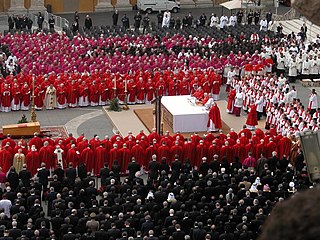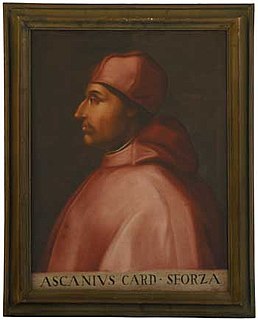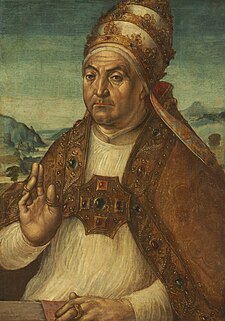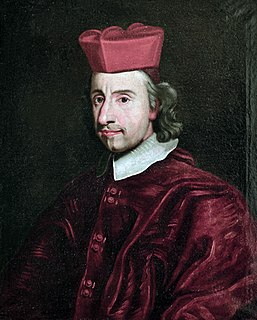
Pope Alexander VI was head of the Catholic Church and ruler of the Papal States from 11 August 1492 until his death in 1503.

Pope Innocent VIII, born Giovanni Battista Cybo, was head of the Catholic Church and ruler of the Papal States from 29 August 1484 to his death. Son of the viceroy of Naples, Battista spent his early years at the Neapolitan court. He became a priest in the retinue of Cardinal Calandrini, half-brother to Pope Nicholas V (1447–55), Bishop of Savona under Pope Paul II, and with the support of Cardinal Giuliano Della Rovere. After intense politicking by Della Rovere, Cibo was elected pope in 1484. King Ferdinand I of Naples had supported Cybo's competitor, Rodrigo Borgia. The following year, Pope Innocent supported the barons in their failed revolt.
Year 1492 (MCDXCII) was a leap year starting on Sunday of the Julian calendar.

The College of Cardinals, or more formally the Sacred College of Cardinals, is the body of all cardinals of the Catholic Church. As of 1 October 2022, its current membership is 226, of whom 129 are eligible to vote in a conclave to elect a new pope. Cardinals are appointed by the pope for life. Changes in life expectancy partly account for the increases in the size of the college.

William Henry O'Connell was an American cardinal of the Catholic Church. He served as Archbishop of Boston from 1907 until his death in 1944, and was made a cardinal in 1911.

A papal conclave is a gathering of the College of Cardinals convened to elect a bishop of Rome, also known as the pope. Catholics consider the pope to be the apostolic successor of Saint Peter and the earthly head of the Catholic Church.

Ascanio Maria Sforza Visconti was an Italian Cardinal of the Catholic Church. Generally known as a skilled diplomat who played a major role in the election of Rodrigo Borgia as Pope Alexander VI, Sforza served as Vice-Chancellor of the Holy Roman Church from 1492 until 1505.
Orsini is a surname of Italian origin, originally derived from Latin ursinus ("bearlike") and originating as an epithet or sobriquet describing the name-bearer's purported strength. Notable people with the surname include the following:

The 1492 papal conclave was convened after the death of Pope Innocent VIII. It was the first papal conclave to be held in the Sistine Chapel.

A conclave capitulation was a compact or unilateral contract drawn up by the College of Cardinals during a papal conclave to constrain the actions of the pope elected by the conclave. The legal term capitulation more frequently refers to the commitment of a sovereign state to relinquish jurisdiction within its borders over the subjects of a foreign state. Before balloting began, all cardinals present at the conclave would swear to be bound by its provisions if elected pope. Capitulations were used by the College of Cardinals to assert its collective authority and limit papal supremacy, to "make the Church an oligarchy instead of a monarchy." Similar electoral capitulations were used on occasion from the 14th to the 17th centuries in Northern and Central Europe to constrain an elected king, emperor, prince, or bishop.
Giovanni Battista Savelli was an Italian Roman Catholic cardinal. He was born into the aristocratic Savelli family, which had produced two popes: Honorius III (1216–1227) and Honorius IV (1285–1287) and numerous cardinals carrying this surname: Bertrando, Silvio, Giulio, Fabrizio, Paolo and Domenico Savelli.

The 1471 papal conclave elected Pope Sixtus IV following the death of Pope Paul II. With the exception of the conclaves of the Western Schism, this conclave was the first since 1305 to feature a working, two-thirds majority of Italians within the College of Cardinals, in no small part because of the absence of six non-Italian cardinals. This was in part due to the unexpectedness of the death of Paul II.

The 1644 papal conclave was called upon the death of Pope Urban VIII. It lasted from 9 August to 15 September 1644; the cardinal electors chose Cardinal Giovanni Battista Pamphili, who took office as Pope Innocent X.

The 1689 papal conclave was convened after the death of Pope Innocent XI. It led to the election of Cardinal Pietro Vito Ottoboni as Pope Alexander VIII. The conclave saw previous factions join together because they lacked numerical strength, and saw the rise of the zelanti as a political force in the election of the next pope. Ottoboni was eventually unanimously elected with the consent of the secular monarchs, becoming the first Venetian in over 200 years to be elected pope.

Francesco Adriano Ceva was a Catholic Cardinal from Savoy.

Paluzzo Paluzzi Altieri degli Albertoni was an Italian Catholic Cardinal and Cardinal-Nephew to Pope Clement X.
Federico di Sanseverino was an Italian Roman Catholic cardinal of the 16th century.

Dudum siquidem is a papal bull issued by Pope Alexander VI Borgia on 26 September 1493, one of the Bulls of Donation addressed to the Catholic Monarchs Isabella I of Castile and Ferdinand II of Aragon which supplemented the bull Inter caetera and purported to grant to them "all islands and mainlands whatsoever, found and to be found, discovered and to be discovered, that are or may be or may seem to be in the route of navigation or travel towards the west or south, whether they be in western parts, or in the regions of the south and east and of India".
Aeterni Patris Filius, also called Aeterni Patris, was a bull issued by Pope Gregory XV on 15 November 1621 that regulated papal conclaves. Together with the bull Decet Romanum pontificem of 1622, it formed the canonical basis for papal elections until the 20th century. The bull brought about many reforms to the papal election system, created structured rules, and sought to decrease the influence of organized factions within the College of Cardinals during the conclave as well as decrease the influence of secular monarchs on papal elections. It established general rules for the conclave process, while the later bull Decet Romanum pontificem addressed the ceremonial aspects of papal elections.
This page is based on this
Wikipedia article Text is available under the
CC BY-SA 4.0 license; additional terms may apply.
Images, videos and audio are available under their respective licenses.












